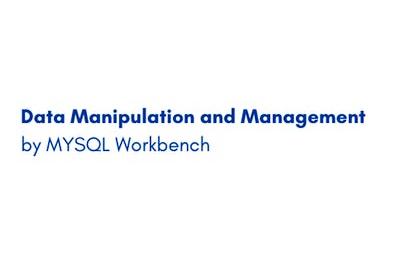

Our Courses

Access Controls
Welcome to Access Controls! The Access Controls Course provides information pertaining to specify what users are permitted to do, the resources they are allowed to access, and what operations they are able to perform on a system. Access Controls help managers limit and monitor systems use at a user level or group membership.
-
Course by

-
 Self Paced
Self Paced
-
 15 hours
15 hours
-
 English
English

Data Manipulation and Management using MYSQL Workbench
By the end of this project, you will be able to manage data efficiently in a specific database using MYSQL Workbench. You will be able to select data from tables from your database and use keywords in select statements such as LIMIT and Top. You will be able to update the data and filter them using where statements, and also apply conditions with different ways and keywords such as like, and, or, and between.
-
Course by

-
 Self Paced
Self Paced
-
 3 hours
3 hours
-
 English
English

Developing Back-End Apps with Node.js and Express
In a recent Stack Overflow survey, Node.js was used by about 50% of the developers who answered the survey, making it the most used server-side technology. Express ranked as the fourth most popular web technology overall, making it the most popular server-side web framework. In this course, you will focus on Node.js and Express.
-
Course by

-
 Self Paced
Self Paced
-
 13 hours
13 hours
-
 English
English

Applied Analytics and Data for Decision Making
By the end of this course, learners are prepared to identify and test the best solutions for improving performance and integrating concepts from operational excellence methodologies for optimum data-driven decision making. The course begins with a focus on deciphering the root cause of problems through a variety of tools before determining and assessing best-fit solutions. Learners discover how to apply ISO, Lean and Six Sigma in the pursuit of aligning organizational operations data with performance standards.
-
Course by

-
 Self Paced
Self Paced
-
 11 hours
11 hours
-
 English
English

Dialogflow Logging and Monitoring in Operations Suite
This is a self-paced lab that takes place in the Google Cloud console. In this lab you will learn how to use Dialogflow tools to troubleshoot your Virtual Agent.
-
Course by

-
 Self Paced
Self Paced
-
 English
English

Scale Up Specialization Capstone
In the Scale Up Specialization Capstone, you'll develop insights into how and why start-ups scale up across their entire business - from products and processes, to sales and marketing, and all the way through to company culture.
-
Course by

-
 Self Paced
Self Paced
-
 2 hours
2 hours
-
 English
English

DevOps for Network Automation (NetDevOps)
This course will introduce students to various DevOps tools, such as Git and virtual environments for Python Development, and explain the concept of continuous integration. The topics of how different development methodologies are used in DevOps, such as the agile process.
-
Course by

-
 Self Paced
Self Paced
-
 4 hours
4 hours
-
 English
English

Jakarta Persistence (JPA)
This course takes the student through a variety of labs exploring the interaction between Java Object Domain Models and Relational Database Tables, this is becoming the standard approach for database access in Java Applications. The course will illustrate how using meta data annotations, you can map domain objects to database tables, and class properties to columns in those tables for CRUD operations. The student will use numerous Query strategies to retrieve data from a database and consume the data in their applications with minimal effort.
-
Course by

-
 Self Paced
Self Paced
-
 13 hours
13 hours
-
 English
English

Sales Operations: Final Project
In the final project for the Sales Operations/Management Specialization, learners will be asked to apply the knowledge they have obtained by performing a critical analysis of a real-world business. Learners are to select a business that has a sales function/operation. The learners are to identify the manager responsible for the sales function (typically called a Sales Manager) and interview this person on the sales management practices at this firm.
-
Course by

-
 Self Paced
Self Paced
-
 English
English

Use Python for Non-Data Role
Even if you are not a person with a data specific role, knowing how to work with data is becoming a highly in-demand skill. More and more companies are collecting data, storing data, and making data-based decisions. From marketing to human resources, to finance and operations, knowing the basics of how to use a data language such as Python will make you even more desirable, valuable, and useful to your company. In this project, learners will learn how to get started with Python.
-
Course by

-
 Self Paced
Self Paced
-
 2 hours
2 hours
-
 English
English

Visual Basic Programming: Classes and Collections
This course is the third course in a series that aims to prepare you for a role working as a programmer. In this course, you will be introduced to the four main concepts in programming: Advanced String Operations and Dates, Modeling Classes, Development of Classes and Collections. Labs will allow the students to apply the material in the lectures in simple computer programs designed to re-enforce the material in the lesson.
-
Course by

-
 Self Paced
Self Paced
-
 28 hours
28 hours
-
 English
English

Python Essentials for MLOps
Python Essentials for MLOps (Machine Learning Operations) is a course designed to provide learners with the fundamental Python skills needed to succeed in an MLOps role. This course covers the basics of the Python programming language, including data types, functions, modules and testing techniques. It also covers how to work effectively with data sets and other data science tasks with Pandas and NumPy. Through a series of hands-on exercises, learners will gain practical experience working with Python in the context of an MLOps workflow.
-
Course by

-
 Self Paced
Self Paced
-
 23 hours
23 hours
-
 English
English

Create an Employee Feedback Survey with TypeForm
Typeform is an online SaaS company that specializes in dynamic form building and online surveys. Typeform is used by large corporations and small businesses for a variety of different business operations. You will see Typeform used in analytics & reporting, collaboration, customer support, email marketing, lead generation, and so much more. Typeform works in conjunction with several well-known apps to seamlessly inegrate into your marketing & sales environment.
-
Course by

-
 Self Paced
Self Paced
-
 3 hours
3 hours
-
 English
English

Getting Started with Git and GitHub
Get started with Git and GitHub in this self-paced, introductory course! You’ll become familiar with collaborative version control and popular Git platforms. Collaboration and social coding are crucial parts of contemporary Software Engineering practices and the DevOps culture. You will begin this course with an overview of Git and Github fundamentals and explore key Git concepts such as branching and repositories, as well as the use of Git commands. You will also learn and practice various Git concepts such as forking, cloning and merging workflows using hands-on labs.
-
Course by

-
 Self Paced
Self Paced
-
 8 hours
8 hours
-
 English
English

Analyze Apple's Stock and Financials with Bloomberg Terminal
In this 1-hour long guided tutorial, you will learn how to use Bloomberg to access equities and financials data, analyze and interpret stock and financial data, use Bloomberg DES, GP, ANR, FA, MODL, and EQRV functions. Note: This tutorial works best for learners who are based in the North America region.
-
Course by

-
 Self Paced
Self Paced
-
 3 hours
3 hours
-
 English
English

Ansible for Network Automation
This course will train you on the fundamentals of Ansible, an open-source, extensible configuration management tool that streamlines infrastructure management in modern networking environments. You will also learn about Jinja2, a templating language that expands flexibility in automation tasks.
-
Course by

-
 Self Paced
Self Paced
-
 3 hours
3 hours
-
 English
English

Security Operations and Administration
Security operations and administration is the task of identifying an organization's information assets and the documentation needed for policy implementation, standards, procedures, and guidelines to ensure confidentiality, integrity, and availability. You will understand the process necessary for working with management and information owners, custodians, and users so that proper data classifications are defined.
-
Course by

-
 Self Paced
Self Paced
-
 16 hours
16 hours
-
 English
English

Start Your API Testing Journey With Postman Tool
Postman - The Collaboration Platform for API Development. Postman's features simplify each step of building an API and streamline collaboration so you can create better APIs faster. This project will provide you step by step instructions to write scripts to test API testing using Postman, how to test CRUD (Create, Read, Update and Delete) operations with HTTP methods like GET, POST, PUT and DELETE, understanding JSON request and response, adding assertions to the API response.
-
Course by

-
 Self Paced
Self Paced
-
 3 hours
3 hours
-
 English
English

Investment Risk Management
By the end of the project, you will learn how to quantify risk-to-reward using Treynor Ratio, and calculate the value at risk for investment portfolio. ATTENTION: To take this course, it is required that you are familiar basic financial risk management concepts. You can gain them by taking the guided project Compare Stock Returns with Google Sheets. Note: This course works best for learners who are based in the North America region.
-
Course by

-
 Self Paced
Self Paced
-
 2 hours
2 hours
-
 English
English

SQL: A Practical Introduction for Querying Databases
Much of the world's data lives in databases. SQL (or Structured Query Language) is a powerful programming language that is used for communicating with and manipulating data in databases. A working knowledge of databases and SQL is a must for anyone who wants to start a career in Data Engineering, Data Warehousing, Data Analytics, Data Science or Business Intelligence.
-
Course by

-
 Self Paced
Self Paced
-
 21 hours
21 hours
-
 English
English

Risk Management: Use of Access Controls to Protect Assets
Course 2: Understanding Risk Management Options and the Use of Access Controls to Protect Assets
-
Course by

-
 Self Paced
Self Paced
-
 6 hours
6 hours
-
 English
English

Analyzing Company Performance using Ratios
In this 2-hour long project-based course, you will learn how to examine the company’s performance on a yearly basis, as well as against their peers. The learners will be able to analyze the company’s performance in terms of profitability, liquidity, activity, and solvency. The learners then will be able to communicate their findings.
Note: This course works best for learners who are based in the North America region. We're currently working on providing the same experience in other regions.
-
Course by

-
 Self Paced
Self Paced
-
 3 hours
3 hours
-
 English
English

Cloud SQL for SQL Server: Qwik Start
This is a self-paced lab that takes place in the Google Cloud console. This lab shows you how to create and connect to a SQL Server instance and perform basic SQL operations using the Google Cloud Console and a client.…
-
Course by

-
 Self Paced
Self Paced
-
 English
English

Optimizing Applications Using Cloud Profiler
This is a self-paced lab that takes place in the Google Cloud console. In this lab, you will learn how to use the Cloud Operations Tracing and Profiler tools to diagnose and correct application latencies.
-
Course by

-
 Self Paced
Self Paced
-
 2 hours
2 hours
-
 English
English

Serverless Data Processing with Dataflow: Operations
In the last installment of the Dataflow course series, we will introduce the components of the Dataflow operational model. We will examine tools and techniques for troubleshooting and optimizing pipeline performance. We will then review testing, deployment, and reliability best practices for Dataflow pipelines. We will conclude with a review of Templates, which makes it easy to scale Dataflow pipelines to organizations with hundreds of users. These lessons will help ensure that your data platform is stable and resilient to unanticipated circumstances.
-
Course by

-
 Self Paced
Self Paced
-
 10 hours
10 hours
-
 English
English



